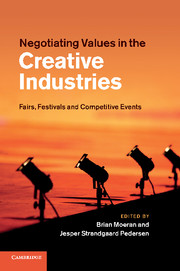Book contents
- Frontmatter
- Contents
- Figures
- Tables
- Contributors
- Acknowledgements
- Introduction
- 1 A Salon’s life
- 2 Art fairs
- 3 Biennalization and its discontents
- 4 Staging auctions
- 5 The book fair as a tournament of values
- 6 Inventing universal television
- 7 Transforming film product identities
- 8 Event institutionalization and maintenance
- 9 Tradition and transformation at the Fan Fair festival
- 10 Between art and commerce
- 11 Configuring sustainability at fashion week
- 12 An inconvenient truce
- 13 The retrospective use of tournament rituals in field configuration
- Afterword Converting values into other values
- Author index
- Subject index
- References
6 - Inventing universal television
restricted access, promotional extravagance, and the distribution of value at global television markets
Published online by Cambridge University Press: 25 October 2011
- Frontmatter
- Contents
- Figures
- Tables
- Contributors
- Acknowledgements
- Introduction
- 1 A Salon’s life
- 2 Art fairs
- 3 Biennalization and its discontents
- 4 Staging auctions
- 5 The book fair as a tournament of values
- 6 Inventing universal television
- 7 Transforming film product identities
- 8 Event institutionalization and maintenance
- 9 Tradition and transformation at the Fan Fair festival
- 10 Between art and commerce
- 11 Configuring sustainability at fashion week
- 12 An inconvenient truce
- 13 The retrospective use of tournament rituals in field configuration
- Afterword Converting values into other values
- Author index
- Subject index
- References
Summary
International television programming ‘markets’ are extravagant events. Unlike the film or animation festivals examined elsewhere in this volume, however, television markets do not spotlight prestigious awards competitions or high-wattage star power; the markets, ostensibly, are all about business. ‘We don’t call them fairs or festivals’, insists a representative of one of the largest markets, ‘we call them markets or trade shows’ (personal interview, 2002). This insistence on proper terminology reveals a deeper anxiety about the value of the markets, especially the extravagances that are largely responsible for their festival- or fair-like atmosphere.
Television markets are essential to programme trade in two main ways: firstly, they provide unprecedented market intelligence about programming trends and industry developments; secondly, they function, in Brian Moeran’s phrase, as ‘tournaments of values’ (Appadurai, 1986, as well as Chapter 1 by Delacour and Leca and Chapter 13 by Anand), where a range of social and cultural values get transcoded into economic value. Indeed, the very extravagances that worry market organizers are central to these tournaments and, ultimately, to international programme exchange. As perhaps the most business-like of all cultural industry gatherings, international television markets demonstrate just how central extravagance is to the proper functioning of cultural trade, as it creates scarcity in otherwise glutted markets.
- Type
- Chapter
- Information
- Negotiating Values in the Creative IndustriesFairs, Festivals and Competitive Events, pp. 145 - 168Publisher: Cambridge University PressPrint publication year: 2011
References
- 9
- Cited by



